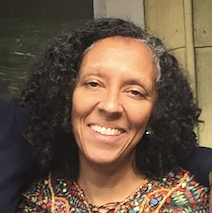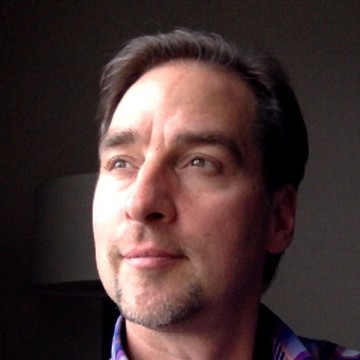Posted in What We Are Reading
November 22, 2016
Dreading the conversation over the Thanksgiving table this week?
Not looking forward to reconnecting with a friend, colleague or relative who thinks very differently than you?
How about inviting them into a different kind of conversation—one that enables folks to hear one another across deep divides and to share differing perspectives without inflicting excessive injury.
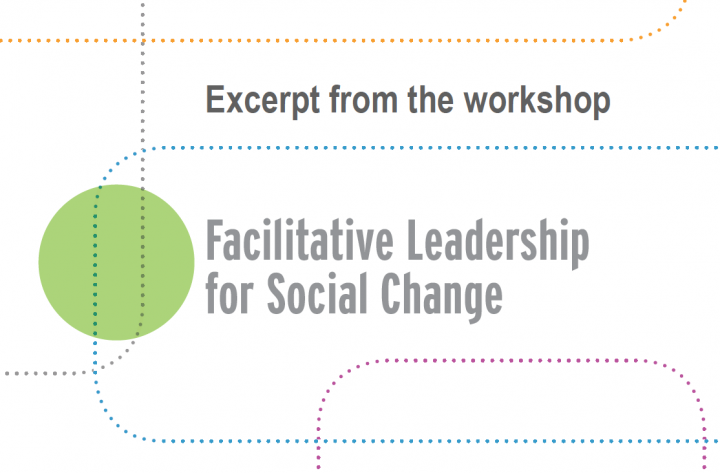
Try introducing the practices of deep listening to unlock a conversation where everyone can both speak their truth and hear other folks’ truths without convincing, berating, or arguing.
Try introducing the practices of deep listening to unlock a conversation where everyone can both speak their truth and hear other folks’ truths without convincing, berating, or arguing. It’s harder than you might think, especially when you think you are right. But remember, these loved ones probably think they are right, too. And, in entrenched conflicts, everyone generally tends to view themselves as the victim and others as holding all the power. Deep listening can be a powerful way to break through all of that.
In these times, deep listening seems more necessary than ever. So, take the risk to really listen to those around you without trying to convert them to your way of thinking. And ask them to take the risk to really listen to you too, without trying to convert you to their way of thinking. Some of what you hear may make your blood boil. Some may make you shake your head in wonder or despair. Some will make you want to ask more questions. This is good – seeking to understand does not imply you agree. Only that you are willing to explore. In the end, if you can use the guidelines shared below, you’ll create a safe space for conversation where you’ll end up still loving one another and you’ll be better informed and better able to engage in the tumult that is our political space this holiday season and beyond. Let us know what you learn!
Tips for Deep Listening
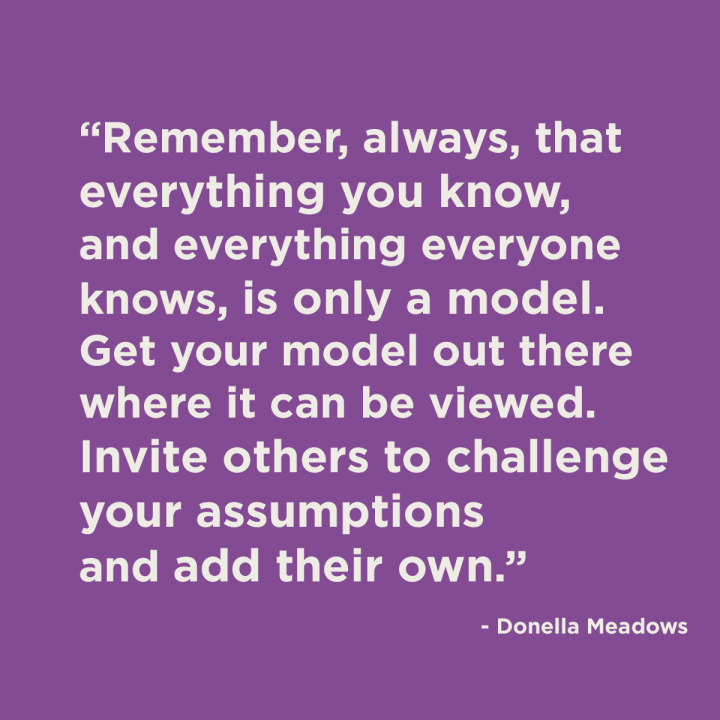
June 16, 2016
Language shapes reality and our consciousness. As neuroscience and leadership expert Judith Glazer says, “words create worlds.” World-renowned organizational consultant Fernando Flores, a former Chilean political prisoner, teaches that relationships, organizations, teams, and all forms of collaboration exist in language. Language alters moods and affects our bodies. It is fundamental to our success, and we need to pay attention to it. The Sum Of Us Progressive Style Guide is a powerful resource to help us more humanely “harness language in support of intersectionality and cross-sector power building” (pg. 2).
Read More
November 3, 2015
“The goal is not so much to see that which no one has seen, but to see that which everyone else sees in a totally different way.”
– Arthur Schopenhauer
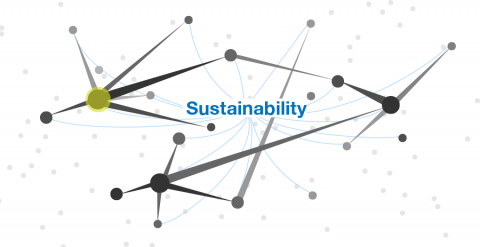
I just finished reading The New Science of Sustainability:Building a Foundation for Great Change, which added depth and nuance to my understanding of the importance of thinking and working in networked ways to create social change. Lead author Sally J. Goerner isScience Advisor to the Capital Institute and lectures worldwide on how the science of “energy networks” can provide measures and an overall narrative for supporting social, economic, and ecological sustainability. Read More
September 4, 2015
“Innovation is as much a function of the right kind of relationships as it is of a particular kind of individual vision.”
-Carter Phipps
 I generally cap off the summer with a post about some of my summer reading. I am still working on something to capture take-aways from one of my favorite reads – The New Science of Sustainability: Building a Foundation for Great Change – and am offering here a revised post from a few years back that focuses on a still very timely book.
I generally cap off the summer with a post about some of my summer reading. I am still working on something to capture take-aways from one of my favorite reads – The New Science of Sustainability: Building a Foundation for Great Change – and am offering here a revised post from a few years back that focuses on a still very timely book.
I ended my summer reading with what was for me a fascinating book – Evolutionaries by Carter Phipps. Phipps is the editor of EnlighteNext magazine and enthusiastic about what we calls “the evolutionary worldview” and how it is showing up in many different fields, from biology to sociology to philosophy and theology. He sees this perspective as transforming understandings of just about everything. Evolutionaries does a great service by deepening and broadening as well as bringing much more nuance to what I see as a very important perspective for the work of social change. Read More
June 25, 2015
“A beautiful question is an ambitious yet actionable question that can begin to shift the way we perceive or think about something – and that might serve as a catalyst to bring about change.”
– Warren Berger
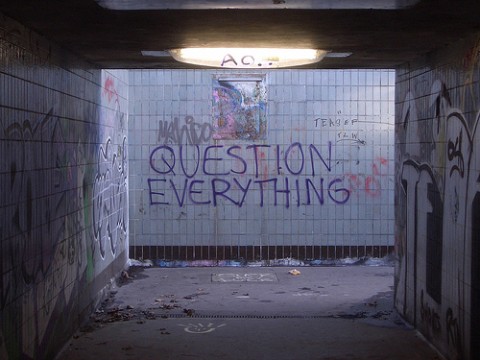
Photo by Duncan Hull
One of my favorite reads of the past couple of years is Warren Berger’s A More Beautiful Question: The Power of Inquiry to Spark Breakthrough Ideas. It continues to strike me as being an important book for any social change agent. Early on, Berger begins with the following provocative statement, that rings true to personal experience:
“Well meaning people are often trying to solve a problem by answering the wrong question.”
In some cases this is because they have not paused long enough, if at all, to consider the underlying question their efforts are trying to solve (risking “active laziness” which I blogged about a couple of weeks ago). Or, as my colleague Cynthia Silva Parker has said, they are “solving for solution,” essentially promoting and/or fighting over their own preferred approaches. And so they continue to offer the same old, ineffective and outdated, approaches or products. This is especially problematic in a time of such change and flux, when we can’t fall back reliably on what we already know. Read More
March 4, 2015
“You’ve got to keep asserting the complexity and the originality of life, and the multiplicity of it, and the facets of it.”
– Toni Morrison

I’ve been re-reading Niels Pfleaging’s short book Organize for Complexity and appreciating how it succinctly captures the current challenges for many groups and organizations trying to navigate complexity while clinging to old tools and beliefs. This can also be the nature of social change work amidst the significant shifts we are seeing. Here’s the trick – as things shift more, and more rapidly, people’s natural inclination may be to try to exert greater control or dig in to what is familiar but does not work. The more one does so, the worse things can get. As Pfleaging writes, we see a “high price for the illusion of control.” Within organizations this takes the form of various gaps – social, functional, and temporal – that make them increasingly irrelevant and ineffective. Responding to complexity requires (to borrow a phrase from Eugene Kim) new muscles and mindsets.
If I could summarize my own reading of Pflaegings’s book, I would put it this way – the world we are living into requires more integrated ways of seeing and doing, and this is hard to do (if not impossible) if people maintain highly differentiated ways of organizing themselves. There is really a baseline call for self-awareness and mindfulness so that one is able to respond not by default or fear, but with perspective and intention, which connects to the idea of “strengthening the network within” at the individual level. And it is important to reach out and connect this self-awareness to others . . .
“Problem-solving in a life-less system is about instruction. Problem-solving in a living system is about communication.”
-Niels Pflaeging
Read More
January 13, 2015
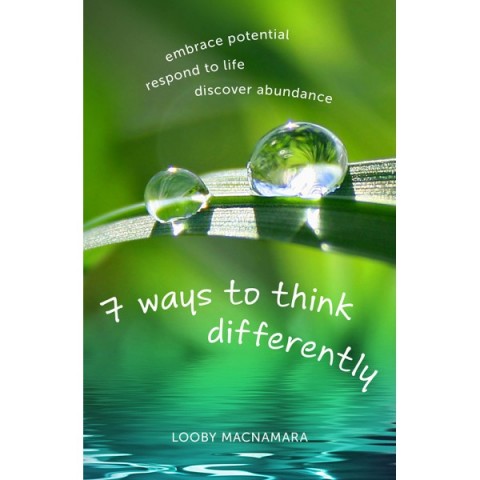
About 20 years ago I was introduced to the field of ecological design called permaculture, not in any great depth mind you, but from what I learned at the time, I was struck by how refreshing, sensible, and vital the practitioners’ perspective and approach were. Since then, and especially in recent years, interest in permaculture seems to have significantly grown (including my own) and its principles stretched beyond sustainable agriculture to human communities. Looby MacNamara is one of the teachers and practitioners who is helping with the more widespread application of permaculture principles. I just finished reading her short book, 7 Ways to Think Differently, which I recommend. In it she unites different ways of thinking (such as systems thinking and solutions thinking) with the underlying philosophical and methodological elements of “regenerative design.”
For me, one particularly fertile area is “abundance thinking.” I have to offer a bit of a pre-qualification that the word “abundance” can be used in certain contexts that I find off-putting, especially when there is little demonstrated understanding of existing structural inequities in society. That said, I think that “leading with abundance” as a mental exercise can provide valuable insights and approaches to social change. Here are a few thoughts, and I invite additions, reactions and push back: Read More
December 18, 2014
“The way of the Essentialist means living by design, not by default.”
– Greg McKeown

I’m currently reading Greg McKeown’s book Essentialism: The Disciplined Pursuit of Less, which I’ll admit I had been tempted to look at earlier in the year and then decided not to for a couple of reasons. First of all, to me the sub-title smacked of a certain level of privilege, given that there are so many people who need more not less – more resources in the face of poverty, more fundamental regard for their humanity and rights in the face of injustice. In addition and seemingly validating of my initial wariness, the book’s opening stories focus on Silicon Valley executives and other corporate players. And yet at the same time I was pulled in by this notion of “essentialism,” embodied in one of the opening quotes attributed to writer, linguist and inventor Lin Yutang:
The wisdom of life consists in the elimination of non-essentials.
Read More
August 11, 2014

Photo by Synopia
A number of readings I’ve come across lately reference the important consideration of organizational structure and how it encourages or discourages collaboration. In a post from last week, I highlighted the book Reinventing Organizations by Frederic Laloux, which focuses on “evolutionary (Teal) organizations” that embrace an ethic of self-organization to facilitate more purpose-driven, holistic and responsible engagement on the part of organizational members. In order to encourage self-organization and intrinsic motivation, these entities adopt less formally hierarchical and fixed-role structures in favor of fluidity and networked leadership. According to Laloux, this brings more timeliness and relevance to the inner workings and responsiveness of these organizations. Read More
July 30, 2014
“Re-examine all that you have been told . . . dismiss that which insults your soul.”
– Walt Whitman

Developmental theory is the source of some good healthy discussion within the Interaction Institute for Social Change. On the one hand, some point out that the notion of “stages of development” has been used to classify and oppress people, especially when theories come from privileged and powerful purveyors, are overly deterministic and linear, and do not account for cultural location and variation. On the other hand, some point to the “empowering” notion of evolution and development that can help liberate people from fixed and mechanistic views of the world and humanity. I had this all very much in mind as I read Reinventing Organizations by Frederic Laloux. Laloux brings developmental and so-called “integral theory,” including the work of Ken Wilber, into the palpable realm of organizational practice and through his research, posits an evolutionary trajectory from aggressive (Red) to bureaucratic (Amber) to achievement-oriented (Orange) to culture/empowerment-oriented (Green) to self-actualizing/authentic (Teal) organizations.
Read More
June 25, 2014
“A beautiful question is an ambitious yet actionable question that can begin to shift the way we perceive or think about something – and that might serve as a catalyst to bring about change.”
– Warren Berger

One of my favorite reads of the past six months is Warren Berger’s A More Beautiful Question: The Power of Inquiry to Spark Breakthrough Ideas. It strikes me as being an important read for any social change agent. Early on, Berger begins with the following provocative statement, that rings true to personal experience:
“Well meaning people are often trying to solve a problem by answering the wrong question.”
In some cases this is because they have not paused long enough, if at all, to consider the underlying question their efforts are trying to solve. Or, as my colleague Cynthia Parker has said, they are “solving for solution,” essentially promoting and/or fighting over their own preferred approaches. And so they continue to offer the same old, ineffective and outdated, approaches or products. This is especially problematic in a time of such change and flux, when we can’t fall back reliably on what we already know. Read More
June 17, 2014
I like to describe the Interaction Institute for Social Change as a collaboration shop. I like to describe my work as helping people work better together. Certainly any article tilted “The Collaboration Paradox: Why Working Together Often Yields Weaker Results” is bound to get my attention.
I find this to be a powerful piece, and it confirms intuitions and observations from my ten years of doing this work. It is too often that we collaborate for collaboration’s sake. And it is too often that we fall into the tyranny of a consensus that yields subpar results.

Illustration: Oscar Ramos Orozco Read More

